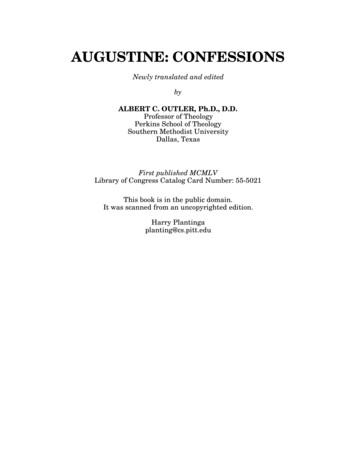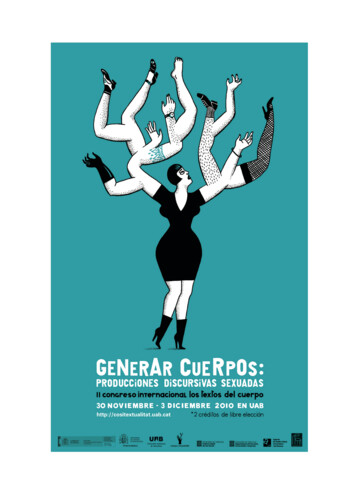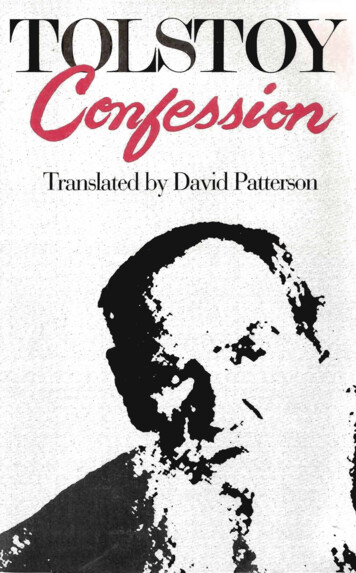
Transcription
AUGUSTINE: CONFESSIONSNewly translated and editedbyALBERT C. OUTLER, Ph.D., D.D.Professor of TheologyPerkins School of TheologySouthern Methodist UniversityDallas, TexasFirst published MCMLVLibrary of Congress Catalog Card Number: 55-5021This book is in the public domain.It was scanned from an uncopyrighted edition.Harry Plantingaplanting@cs.pitt.edu
IntroductionLIKE A COLOSSUS BESTRIDING TWO WORLDS, Augustine stands as the last patristicand the first medieval father of Western Christianity. He gathered together andconserved all the main motifs of Latin Christianity from Tertullian to Ambrose; heappropriated the heritage of Nicene orthodoxy; he was a Chalcedonian beforeChalcedon--and he drew all this into an unsystematic synthesis which is still ourbest mirror of the heart and mind of the Christian community in the RomanEmpire. More than this, he freely received and deliberately reconsecrated thereligious philosophy of the Greco-Roman world to a new apologetic use inmaintaining the intelligibility of the Christian proclamation. Yet, even in his role assummator of tradition, he was no mere eclectic. The center of his “system” is in theHoly Scriptures, as they ordered and moved his heart and mind. It was in Scripturethat, first and last, Augustine found the focus of his religious authority.At the same time, it was this essentially conservative genius who recast thepatristic tradition into the new pattern by which European Christianity would belargely shaped and who, with relatively little interest in historical detail, wroughtout the first comprehensive “philosophy of history.” Augustine regarded himself asmuch less an innovator than a summator. He was less a reformer of the Churchthan the defender of the Church’s faith. His own self-chosen project was to saveChristianity from the disruption of heresy and the calumnies of the pagans, and,above everything else, to renew and exalt the faithful hearing of the gospel of man’sutter need and God’s abundant grace. But the unforeseen result of this enterprisewas to furnish the motifs of the Church’s piety and doctrine for the next thousandyears and more. Wherever one touches the Middle Ages, he finds the marks ofAugustine’s influence, powerful and pervasive--even Aquinas is more of anAugustinian at heart than a “proper” Aristotelian. In the Protestant Reformation,the evangelical elements in Augustine’s thought were appealed to in condemnationof the corruptions of popular Catholicism--yet even those corruptions had a certainright of appeal to some of the non-evangelical aspects of Augustine’s thought andlife. And, still today, in the important theological revival of our own time, theinfluence of Augustine is obviously one of the most potent and productive impulsesat work.A succinct characterization of Augustine is impossible, not only because histhought is so extraordinarily complex and his expository method so incurablydigressive, but also because throughout his entire career there were lively tensionsand massive prejudices in his heart and head. His doctrine of God holds thePlotinian notions of divine unity and remotion in tension with the Biblical emphasisupon the sovereign God’s active involvement in creation and redemption. For all hisdevotion to Jesus Christ, this theology was never adequately Christocentric, andthis reflects itself in many ways in his practical conception of the Christian life. Hedid not invent the doctrines of original sin and seminal transmission of guilt but hedid set them as cornerstones in his “system,” matching them with a doctrine ofinfant baptism which cancels, ex opere operato, birth sin and hereditary guilt. Henever wearied of celebrating God’s abundant mercy and grace--but he was also fullypersuaded that the vast majority of mankind are condemned to a wholly just andappalling damnation. He never denied the reality of human freedom and neverallowed the excuse of human irresponsibility before God--but against all detractorsof the primacy of God’s grace, he vigorously insisted on both double predestinationand irresistible grace.For all this the Catholic Church was fully justified in giving Augustine hisaptest title, Doctor Gratiae. The central theme in all Augustine’s writings is the
sovereign God of grace and the sovereign grace of God. Grace, for Augustine, isGod’s freedom to act without any external necessity whatsoever--to act in lovebeyond human understanding or control; to act in creation, judgment, andredemption; to give his Son freely as Mediator and Redeemer; to endue the Churchwith the indwelling power and guidance of the Holy Spirit; to shape the destinies ofall creation and the ends of the two human societies, the “city of earth” and the “cityof God.” Grace is God’s unmerited love and favor, prevenient and occurrent. Ittouches man’s inmost heart and will. It guides and impels the pilgrimage of thosecalled to be faithful. It draws and raises the soul to repentance, faith, and praise. Ittransforms the human will so that it is capable of doing good. It relieves man’sreligious anxiety by forgiveness and the gift of hope. It establishes the ground ofChristian humility by abolishing the ground of human pride. God’s grace becameincarnate in Jesus Christ, and it remains immanent in the Holy Spirit in theChurch.Augustine had no system--but he did have a stable and coherent Christianoutlook. Moreover, he had an unwearied, ardent concern: man’s salvation from hishopeless plight, through the gracious action of God’s redeeming love. To understandand interpret this was his one endeavor, and to this task he devoted his entiregenius.He was, of course, by conscious intent and profession, a Christian theologian,a pastor and teacher in the Christian community. And yet it has come about thathis contributions to the larger heritage of Western civilization are hardly lessimportant than his services to the Christian Church. He was far and away the best-if not the very first--psychologist in the ancient world. His observations anddescriptions of human motives and emotions, his depth analyses of will and thoughtin their interaction, and his exploration of the inner nature of the human self--thesehave established one of the main traditions in European conceptions of humannature, even down to our own time. Augustine is an essential source for bothcontemporary depth psychology and existentialist philosophy. His view of the shapeand process of human history has been more influential than any other singlesource in the development of the Western tradition which regards political order asinextricably involved in moral order. His conception of a societas as a communityidentified and held together by its loyalties and love has become an integral part ofthe general tradition of Christian social teaching and the Christian vision of“Christendom.” His metaphysical explorations of the problems of being, thecharacter of evil, the relation of faith and knowledge, of will and reason, of time andeternity, of creation and cosmic order, have not ceased to animate and enrichvarious philosophic reflections throughout the succeeding centuries. At the sametime the hallmark of the Augustinian philosophy is its insistent demand thatreflective thought issue in practical consequence; no contemplation of the end of lifesuffices unless it discovers the means by which men are brought to their propergoals. In sum, Augustine is one of the very few men who simply cannot be ignored ordepreciated in any estimate of Western civilization without serious distortion andimpoverishment of one’s historical and religious understanding.In the space of some forty-four years, from his conversion in Milan (A.D. 386)to his death in Hippo Regius (A.D. 430), Augustine wrote--mostly at dictation--avast sprawling library of books, sermons, and letters, the remains of which (in theBenedictine edition of St. Maur) fill fourteen volumes as they are reprinted inMigne, Patrologiae cursus completus, Series Latina (Vols. 32-45). In his old age,Augustine reviewed his authorship (in the Retractations) and has left us a criticalreview of ninety-three of his works he judged most important. Even a cursory glanceat them shows how enormous was his range of interest. Yet almost everything he
wrote was in response to a specific problem or an actual crisis in the immediatesituation. One may mark off significant developments in his thought over thistwoscore years, but one can hardly miss the fundamental consistency in his entirelife’s work. He was never interested in writing a systematic summa theologica, andwould have been incapable of producing a balanced digest of his multifacetedteaching. Thus, if he is to be read wisely, he must be read widely--and always incontext, with due attention to the specific aim in view in each particular treatise.For the general reader who wishes to approach Augustine as directly aspossible, however, it is a useful and fortunate thing that at the very beginning of hisChristian ministry and then again at the very climax of it, Augustine set himself tofocus his experience and thought into what were, for him, summings up. The resultof the first effort is the Confessions, which is his most familiar and widely readwork. The second is in the Enchiridion, written more than twenty years later. In theConfessions, he stands on the threshold of his career in the Church. In theEnchiridion, he stands forth as triumphant champion of orthodox Christianity. Inthese two works--the nearest equivalent to summation in the whole of theAugustinian corpus--we can find all his essential themes and can sample thecharacteristic flavor of his thought.Augustine was baptized by Ambrose at Milan during Eastertide, A.D. 387. Ashort time later his mother, Monica, died at Ostia on the journey back to Africa. Ayear later, Augustine was back in Roman Africa living in a monastery at Tagaste,his native town. In 391, he was ordained presbyter in the church of Hippo Regius (asmall coastal town nearby). Here in 395--with grave misgivings on his own part (cf.Sermon CCCLV, 2) and in actual violation of the eighth canon of Nicea (cf. Mansi,Sacrorum conciliorum, II, 671, and IV, 1167)--he was consecrated assistant bishopto the aged Valerius, whom he succeeded the following year. Shortly after heentered into his episcopal duties he began his Confessions, completing themprobably in 398 (cf. De Labriolle, I, vi (see Bibliography), and di Capua, MiscellaneaAgostiniana, II, 678).Augustine had a complex motive for undertaking such a self-analysis.1 Hispilgrimage of grace had led him to a most unexpected outcome. Now he felt acompelling need to retrace the crucial turnings of the way by which he had come.And since he was sure that it was God’s grace that had been his prime mover onthat way, it was a spontaneous expression of his heart that cast his self-recollectioninto the form of a sustained prayer to God.The Confessions are not Augustine’s autobiography. They are, instead, adeliberate effort, in the permissive atmosphere of God’s felt presence, to recall thosecrucial episodes and events in which he can now see and celebrate the mysteriousactions of God’s prevenient and provident grace. Thus he follows the windings of hismemory as it re-presents the upheavals of his youth and the stages of his disorderlyquest for wisdom. He omits very much indeed. Yet he builds his successive climaxesso skillfully that the denouement in Book VIII is a vivid and believable convergenceof influences, reconstructed and “placed” with consummate dramatic skill. We seehow Cicero’s Hortensius first awakened his thirst for wisdom, how the Manicheansdeluded him with their promise of true wisdom, and how the Academics upset hisconfidence in certain knowledge--how they loosed him from the dogmatism of theManicheans only to confront him with the opposite threat that all knowledge isuncertain. He shows us (Bk. V, Ch. X, 19) that almost the sole cause of his1He had no models before him, for such earlier writings as the Meditations of Marcus Aurelius andthe autobiographical sections in Hilary of Poitiers and Cyprian of Carthage have only to be comparedwith the Confessions to see how different they are.
intellectual perplexity in religion was his stubborn, materialistic prejudice that ifGod existed he had to exist in a body, and thus had to have extension, shape, andfinite relation. He remembers how the “Platonists” rescued him from this“materialism” and taught him how to think of spiritual and immaterial reality--andso to become able to conceive of God in non-dualistic categories. We can follow himin his extraordinarily candid and plain report of his Plotinian ecstasy, and hismomentary communion with the One (Book VII). The “Platonists” liberated himfrom error, but they could not loose him from the fetters of incontinence. Thus, witha divided will, he continues to seek a stable peace in the Christian faith while hestubbornly clings to his pride and appetence.In Book VIII, Augustine piles up a series of remembered incidents thatinflamed his desire to imitate those who already seemed to have gained what he hadso long been seeking. First of all, there had been Ambrose, who embodied forAugustine the dignity of Christian learning and the majesty of the authority of theChristian Scriptures. Then Simplicianus tells him the moving story of Victorinus (amore famous scholar than Augustine ever hoped to be), who finally came to thebaptismal font in Milan as humbly as any other catechumen. Then, fromPonticianus he hears the story of Antony and about the increasing influence of themonastic calling. The story that stirs him most, perhaps, relates the dramaticconversion of the two “special agents of the imperial police” in the garden at Treves-two unlikely prospects snatched abruptly from their worldly ways to the monasticlife.He makes it plain that these examples forced his own feelings to anintolerable tension. His intellectual perplexities had become resolved; the virtue ofcontinence had been consciously preferred; there was a strong desire for the stormsof his breast to be calmed; he longed to imitate these men who had done what hecould not and who were enjoying the peace he longed for.But the old habits were still strong and he could not muster a full act of thewhole will to strike them down. Then comes the scene in the Milanese garden whichis an interesting parallel to Ponticianus’ story about the garden at Treves. The longstruggle is recapitulated in a brief moment; his will struggles against and withinitself. The trivial distraction of a child’s voice, chanting, “Tolle, lege,” precipitatesthe resolution of the conflict. There is a radical shift in mood and will, he turnseagerly to the chance text in Rom. 13:13--and a new spirit rises in his heart.After this radical change, there was only one more past event that had to berelived before his personal history could be seen in its right perspective. This wasthe death of his mother and the severance of his strongest earthly tie. Book IX tellsus this story. The climactic moment in it is, of course, the vision at Ostia wheremother and son are uplifted in an ecstasy that parallels--but also differssignificantly from--the Plotinian vision of Book VII. After this, the mother dies andthe son who had loved her almost too much goes on alone, now upheld and led by agreater and a wiser love.We can observe two separate stages in Augustine’s “conversion.” The firstwas the dramatic striking off of the slavery of incontinence and pride which had solong held him from decisive commitment to the Christian faith. The second was thedevelopment of an adequate understanding of the Christian faith itself and hisbaptismal confession of Jesus Christ as Lord and Saviour. The former was achievedin the Milanese garden. The latter came more slowly and had no “dramaticmoment.” The dialogues that Augustine wrote at Cassiciacum the year following hisconversion show few substantial signs of a theological understanding, decisively ordistinctively Christian. But by the time of his ordination to the presbyterate we cansee the basic lines of a comprehensive and orthodox theology firmly laid out.
Augustine neglects to tell us (in 398) what had happened in his thought between385 and 391. He had other questions, more interesting to him, with which towrestle.One does not read far in the Confessions before he recognizes that the term“confess” has a double range of meaning. On the one hand, it obviously refers to thefree acknowledgment, before God, of the truth one knows about oneself--and thisobviously meant, for Augustine, the “confession of sins.” But, at the same time, andmore importantly, confiteri means to acknowledge, to God, the truth one knowsabout God. To confess, then, is to praise and glorify God; it is an exercise in selfknowledge and true humility in the atmosphere of grace and reconciliation.Thus the Confessions are by no means complete when the personal history isconcluded at the end of Book IX. There are two more closely related problems to beexplored: First, how does the finite self find the infinite God (or, how is it found ofhim?)? And, secondly, how may we interpret God’s action in producing this createdworld in which such personal histories and revelations do occur? Book X, therefore,is an exploration of man’s way to God, a way which begins in sense experience butswiftly passes beyond it, through and beyond the awesome mystery of memory, tothe ineffable encounter between God and the soul in man’s inmost subject-self. Butsuch a journey is not complete until the process is reversed and man has looked asdeeply as may be into the mystery of creation, on which all our history andexperience depend. In Book XI, therefore, we discover why time is such a problemand how “In the beginning God created the heavens and the earth” is the basicformula of a massive Christian metaphysical world view. In Books XII and XIII,Augustine elaborates, in loving patience and with considerable allegorical license,the mysteries of creation--exegeting the first chapter of Genesis, verse by verse,until he is able to relate the whole round of creation to the point where we can viewthe drama of God’s enterprise in human history on the vast stage of the cosmositself. The Creator is the Redeemer! Man’s end and the beginning meet at a singlepoint!The Enchiridion is a briefer treatise on the grace of God and representsAugustine’s fully matured theological perspective--after the magnificentachievements of the De Trinitate and the greater part of the De civitate Dei, andafter the tremendous turmoil of the Pelagian controversy in which the doctrine ofgrace was the exact epicenter. Sometime in 421, Augustine received a request fromone Laurentius, a Christian layman who was the brother of the tribune Dulcitius(for whom Augustine wrote the De octo dulcitii quaestionibus in 423-425). ThisLaurentius wanted a handbook (enchiridion) that would sum up the essentialChristian teaching in the briefest possible form. Augustine dryly comments that theshortest complete summary of the Christian faith is that God is to be served by manin faith, hope, and love. Then, acknowledging that this answer might indeed be toobrief, he proceeds to expand it in an essay in which he tries unsuccessfully tosubdue his natural digressive manner by imposing on it a patently artificialschematism. Despite its awkward form, however, the Enchiridion is one of the mostimportant of all of Augustine’s writings, for it is a conscious effort of the theologicalmagistrate of the Western Church to stand on final ground of testimony to theChristian truth.For his framework, Augustine chooses the Apostles’ Creed and the Lord’sPrayer. The treatise begins, naturally enough, with a discussion of God’s work increation. Augustine makes a firm distinction between the comparativelyunimportant knowledge of nature and the supremely important acknowledgment ofthe Creator of nature. But creation lies under the shadow of sin and evil andAugustine reviews his famous (and borrowed!) doctrine of the privative character of
evil. From this he digresses into an extended comment on error and lying as specialinstances of evil. He then returns to the hopeless case of fallen man, to which God’swholly unmerited grace has responded in the incarnation of the Mediator andRedeemer, Jesus Christ. The questions about the appropriation of God’s grace leadnaturally to a discussion of baptism and justification, and beyond these, to the HolySpirit and the Church. Augustine then sets forth the benefits of redeeming graceand weighs the balance between faith and good works in the forgiven sinner. Butredemption looks forward toward resurrection, and Augustine feels he must devotea good deal of energy and subtle speculation to the questions about the manner andmode of the life everlasting. From this he moves on to the problem of the destiny ofthe wicked and the mystery of predestination. Nor does he shrink from these grimtopics; indeed, he actually expands some of his most rigid ideas of God’s ruthlessjustice toward the damned. Having thus treated the Christian faith and Christianhope, he turns in a too-brief concluding section to the virtue of Christian love as theheart of the Christian life. This, then, is the “handbook” on faith, hope, and lovewhich he hopes Laurence will put to use and not leave as “baggage on hisbookshelf.”Taken together, the Confessions and the Enchiridion give us two veryimportant vantage points from which to view the Augustinian perspective as awhole, since they represent both his early and his mature formulation. From them,we can gain a competent--though by no means complete--introduction to the heartand mind of this great Christian saint and sage. There are important differencesbetween the two works, and these ought to be noted by the careful reader. But allthe main themes of Augustinian Christianity appear in them, and through them wecan penetrate to its inner dynamic core.There is no need to justify a new English translation of these books, eventhough many good ones already exist. Every translation is, at best, only anapproximation--and an interpretation too. There is small hope for a translation toend all translations. Augustine’s Latin is, for the most part, comparatively easy toread. One feels directly the force of his constant wordplay, the artful balancing ofhis clauses, his laconic use of parataxis, and his deliberate involutions of thoughtand word order. He was always a Latin rhetor; artifice of style had come to besecond nature with him--even though the Latin scriptures were powerful modifiersof his classical literary patterns. But it is a very tricky business to convey such aLatin style into anything like modern English without considerable violence oneway or the other. A literal rendering of the text is simply not readable English. Andthis falsifies the text in another way, for Augustine’s Latin is eminently readable!On the other side, when one resorts to the unavoidable paraphrase there is alwaysthe open question as to the point beyond which the thought itself is being recast. Ithas been my aim and hope that these translations will give the reader an accuratemedium of contact with Augustine’s temper and mode of argumentation. There hasbeen no thought of trying to contrive an English equivalent for his style. IfAugustine’s ideas come through this translation with positive force and clarity,there can be no serious reproach if it is neither as eloquent nor as elegant asAugustine in his own language. In any case, those who will compare this translationwith the others will get at least a faint notion of how complex and truly brilliant theoriginal is!The sensitive reader soon recognizes that Augustine will not willingly beinspected from a distance or by a neutral observer. In all his writings there is astrong concern and moving power to involve his reader in his own process of inquiryand perplexity. There is a manifest eagerness to have him share in his own flashesof insight and his sudden glimpses of God’s glory. Augustine’s style is deeply
personal; it is therefore idiomatic, and often colloquial. Even in his knottiestarguments, or in the labyrinthine mazes of his allegorizing (e.g., Confessions, Bk.XIII, or Enchiridion, XVIII), he seeks to maintain contact with his reader ingenuine respect and openness. He is never content to seek and find the truth insolitude. He must enlist his fellows in seeing and applying the truth as given. He isnever the blind fideist; even in the face of mystery, there is a constant reliance onthe limited but real powers of human reason, and a constant striving for clarity andintelligibility. In this sense, he was a consistent follower of his own principle of“Christian Socratism,” developed in the De Magistro and the De catechezandisrudibus.Even the best of Augustine’s writing bears the marks of his own time andthere is much in these old books that is of little interest to any but the specialist.There are many stones of stumbling in them for the modern secularist--and even forthe modern Christian! Despite all this, it is impossible to read him with anyattention at all without recognizing how his genius and his piety burst through thelimitations of his times and his language--and even his English translations! Hegrips our hearts and minds and enlists us in the great enterprise to which his wholelife was devoted: the search for and the celebration of God’s grace and glory bywhich his faithful children are sustained and guided in their pilgrimage toward thetrue Light of us all.The most useful critical text of the Confessions is that of Pierre de Labriolle(fifth edition, Paris, 1950). I have collated this with the other major critical editions:Martin Skutella, S. Aureli Augustini Confessionum Libri Tredecim (Leipzig, 1934)-itself a recension of the Corpus Scriptorum ecclesiasticorum Latinorum XXXIII textof Pius Knöll (Vienna, 1896)--and the second edition of John Gibb and WilliamMontgomery (Cambridge, 1927).There are two good critical texts of the Enchiridion and I have collated them:Otto Scheel, Augustins Enchiridion (zweite Auflage, Tübingen, 1930), and JeanRivière, Enchiridion in the Bibliothèque Augustinienne, Œuvres de S. Augustin,première série: Opuscules, IX: Exposés généraux de la foi (Paris, 1947).It remains for me to express my appreciation to the General Editors of thisLibrary for their constructive help; to Professor Hollis W. Huston, who read theentire manuscript and made many valuable suggestions; and to Professor WilliamA. Irwin, who greatly aided with parts of the Enchiridion. These men share thecredit for preventing many flaws, but naturally no responsibility for thoseremaining. Professors Raymond P. Morris, of the Yale Divinity School Library;Robert Beach, of the Union Theological Seminary Library; and Decherd Turner, ofour Bridwell Library here at Southern Methodist University, were especiallygenerous in their bibliographical assistance. Last, but not least, Mrs. Hollis W.Huston and my wife, between them, managed the difficult task of putting theresults of this project into fair copy. To them all I am most grateful.
AUGUSTINE’S TESTIMONY CONCERNINGTHE CONFESSIONSI. THE Retractations, II, 6 (A.D. 427)1. My Confessions, in thirteen books, praise the righteous and good God asthey speak either of my evil or good, and they are meant to excite men’s minds andaffections toward him. At least as far as I am concerned, this is what they did for mewhen they were being written and they still do this when read. What some peoplethink of them is their own affair [ipse viderint]; but I do know that they have givenpleasure to many of my brethren and still do so. The first through the tenth bookswere written about myself; the other three about Holy Scripture, from what iswritten there, In the beginning God created the heaven and the earth,2 even as far asthe reference to the Sabbath rest.32. In Book IV, when I confessed my soul’s misery over the death of a friendand said that our soul had somehow been made one out of two souls, “But it mayhave been that I was afraid to die, lest he should then die wholly whom I had sogreatly loved” (Ch. VI, 11)--this now seems to be more a trivial declamation than aserious confession, although this inept expression may be tempered somewhat bythe “may have been” [forte] which I added. And in Book XIII what I said--“Thefirmament was made between the higher waters (and superior) and the lower (andinferior) waters”--was said without sufficient thought. In any case, the matter isvery obscure.This work begins thus: “Great art thou, O Lord.”II. De Dono Perseverantiae, XX, 53 (A.D. 428)Which of my shorter works has been more widely known or given greaterpleasure than the [thirteen] books of my Confessions? And, although I publishedthem long before the Pelagian heresy had even begun to be, it is plain that in them Isaid to my God, again and again, “Give what thou commandest and command whatthou wilt.” When these words of mine were repeated in Pelagius’ presence at Romeby a certain brother of mine (an episcopal colleague), he could not bear them andcontradicted him so excitedly that they nearly came to a quarrel. Now what, indeed,does God command, first and foremost, except that we believe in him? This faith,therefore, he himself gives; so that it is well said to him, “Give what thoucommandest.” Moreover, in those same books, concerning my account of myconversion when God turned me to that faith which I was laying waste with a verywretched and wild verbal assault,4 do you not remember how the narration showsthat I was given as a gift to the faithful and daily tears of my mother, who had beenpromised that I should not perish? I certainly declared there that God by his graceturns men’s wills to the true faith when they are not only averse to it, but actuallyadverse. As for the other ways in which I sought God’s aid in my growth inperseverance, you either know or c
vast sprawling library of books, sermons, and letters, the remains of which (in the Benedictine edition of St. Maur) fill fourteen volumes as they are reprinted in Migne, Patrologiae cursus completus, Series Latina (Vols. 32-45). In his old age, Augustine reviewed his aut










